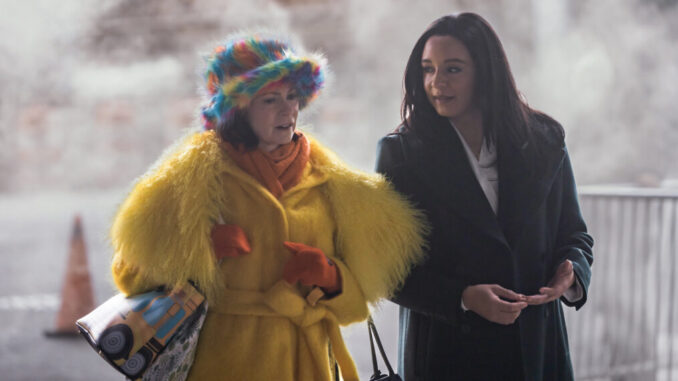
Beyond the Gavel: How "Elsbeth" Echoes and Extends the Legacy of "The Good Wife" and "The Good Fight"
"Elsbeth," CBS's quirky and delightfully observant spin-off from "The Good Wife" and "The Good Fight," arrived with a unique proposition: a fish-out-of-water legal drama bathed in the vibrant hues of New York City. Yet, its connection to the celebrated legal universes that preceded it is undeniable, sparking a constant buzz among fans who eagerly draw comparisons. While "Elsbeth" forges its own distinct path, its echoes of Alicia Florrick's stoicism and Diane Lockhart's fiery activism are palpable, creating a layered experience for viewers familiar with the Good universe.
One of the most immediate parallels drawn is the strong female protagonist. Just as Alicia Florrick navigated the cutthroat world of Chicago law after personal scandal and Diane Lockhart fearlessly challenged the socio-political landscape, Elsbeth Tascioni brings her own unconventional brand of brilliance to the New York legal scene. Alicia, initially a reluctant participant, slowly blossomed into a powerful and independent lawyer, showcasing resilience and strategic thinking. Diane, on the other hand, was already a force to be reckoned with, a seasoned veteran unafraid to tackle thorny issues and fight for what she believed in. Elsbeth, in contrast, arrives fully formed in her eccentricities, her apparent absentmindedness a carefully crafted façade masking a razor-sharp intellect. While she doesn't shoulder the same weight of personal or political battles as her predecessors, her commitment to justice, albeit unconventional, is equally unwavering. Like Alicia, she possesses a keen ability to read people and unravel complex situations. Like Diane, she refuses to be underestimated, using her perceived oddness as a shield and a weapon.
However, the comparison goes deeper than just a strong female lead. The very DNA of "Elsbeth" is infused with the same morally ambiguous and intellectually stimulating themes that defined "The Good Wife" and "The Good Fight." All three shows grapple with the complexities of justice in a flawed system. They explore the ethical compromises lawyers make, the fine lines between right and wrong, and the constant struggle to uphold principles in a world driven by power and ambition. While "Elsbeth" leans towards a lighter, more procedural format, it still presents cases with nuances that force viewers to question their own perceptions. We see glimpses of the ethical dilemmas familiar to fans of the Good universe, albeit often presented with a more whimsical touch.
Furthermore, the supporting characters in "Elsbeth" subtly mirror the complex dynamics that shaped the relationships in the earlier shows. Agent Kaya Blanke, initially skeptical of Elsbeth's methods, is slowly drawn into her unique orbit, mirroring the evolution of relationships like Alicia's with Kalinda or Diane's with Lucca. Captain Wagner, Elsbeth's superior, serves as a voice of authority and a potential foil, offering a counterpoint to Elsbeth's unconventional approach, much like Cary Agos often challenged Alicia's methods in "The Good Wife." These carefully crafted relationships add depth to the narrative and provide opportunities for character growth, echoing the rich ensemble dynamics that made "The Good Wife" and "The Good Fight" so compelling.
Despite the similarities, "Elsbeth" also distinguishes itself, carving out its own niche within the Good universe. Unlike "The Good Wife," which focused on the personal struggles of Alicia Florrick, or "The Good Fight," which tackled weighty political issues head-on, "Elsbeth" is primarily a character-driven procedural. The focus is on the puzzle of the crime and how Elsbeth, with her unique perspective, unravels it. The show avoids the heavy political commentary that became a hallmark of "The Good Fight," opting instead for a lighter tone and a more optimistic outlook. Elsbeth, unlike Alicia and Diane, seems to genuinely enjoy her work and possesses an unwavering belief in the goodness of people, a refreshing contrast to the cynicism that often permeated the previous shows.
In conclusion, the comparisons between "Elsbeth" and its predecessors are inevitable and largely justified. "Elsbeth" inherits the strong female protagonist, the morally ambiguous themes, and the complex character dynamics that defined "The Good Wife" and "The Good Fight." However, it also diverges, forging its own identity with a lighter tone, a focus on the procedural puzzle, and a uniquely optimistic worldview. "Elsbeth" is not simply a rehash of what came before, but rather a loving tribute and a thoughtful expansion of the Good universe, offering fans a fresh perspective while retaining the core elements that made the original shows so beloved. It's a testament to the enduring appeal of smart, character-driven storytelling and a reminder that even in the darkest corners of the legal system, there's always room for a touch of quirky brilliance.
